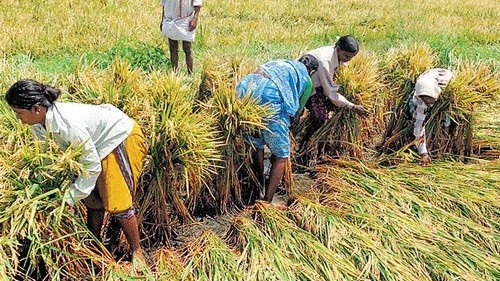
Representative image of agriculture.
Credit: DH file photo
Amid the severe rainfall deficit in the state, farmers who have suffered large-scale crop devastation say they rarely get the crop insurance cover because of lapses in processing the claims.
In 2022-23, for instance, out of the Rs 1,928 crore crop insurance premiums that farmers, state governments and the Union government paid, only Rs 1,094 crore, or 56 per cent, of insurance cover, was provided. Farmers say that most are unable to even complete the insurance claim procedure due to lack of response from the Union government-empanelled private insurance firms.
Across India, out of the Rs 27,900 crore crop insurance premiums paid, only Rs 5,760 crore insurance cover was provided in 2022-2023. Under the Pradhan Mantri Fasal Bima Yojana (PMFBY), farmers pay between 1.5 per cent and 5 per cent of the premium depending on the crop, and the rest is paid by the state and Centre.
As a result, over the years, there has been a drop in interest in the scheme. In Karnataka, crop insurance was widely adopted with 25 lakh farmers opting for it when the PMFBY debuted in 2016. By 2019, this number had dipped to 21 lakh, according to data accessed by DH. Last year, the insurance cover rose to 22 lakh.
Even last year, when excessive rainfall ruined crops in Kalaburagi, Ramesh, a farmer, says he received no support for his cotton and tur dal crops. “After the premium is paid and farmers submit a claim, no insurance official visits the field to assess the crop,” he says.
“They say they will refer satellite images,” he explains.
Only after concerted pressure from a large number of farmers will officials visit, explains Mallikarjuna Ballari, a Haveri-based farmer who has been collectivising farmers to demand that insurance companies follow up on claims responsibly.
An official in the agriculture department says the state has a good procedure to compensate farmers based on yield reduction due to adverse weather events. “Karnataka has maintained historical data and captures crop development real-time through an app,” the official says.
However, in the case of local calamities, the official acknowledged several lapses in procedure. “Insurance companies lack officials at the district and taluk levels to follow up these claims,” the official added.
Samad Patel, joint director of agriculture in Kalaburagi, also recently recommended farmers to contact toll-free helplines to report crop loss due to excessive rainfall, within 72 hours.
Ballari explains that though there are provisions for interim settlements of up to 25 per cent of the insurance amount, the claims generally fall through as officials fail to visit the field within 72 hours of crop loss as specified in the PMFBY.
“Last year, when there was excess of rainfall, we had to protest in front of the district commissioner’s office for some action to be taken,” says Bellari.
The result, according to Mandya-based farmer A L Kempugowda, “Insurance companies benefit more than farmers.”
In fact, according to data tabled in the Rajya Sabha, insurance companies made a surplus or savings of over Rs 40,000 crore from 2016-2017 to 2021-2022. The data shows that the companies paid claims worth Rs 1,19,314 crore against the deposited premium of Rs 1,59,132 crore.
There are three methods of making a claim — through telephone, online or offline. In reality, the offline mode, which is what most farmers prefer due to issues with network and connectivity, is mostly defunct. “Most farmers face issues because of the lack of insurance officials at the zilla, taluk and district levels,” Ballari says.